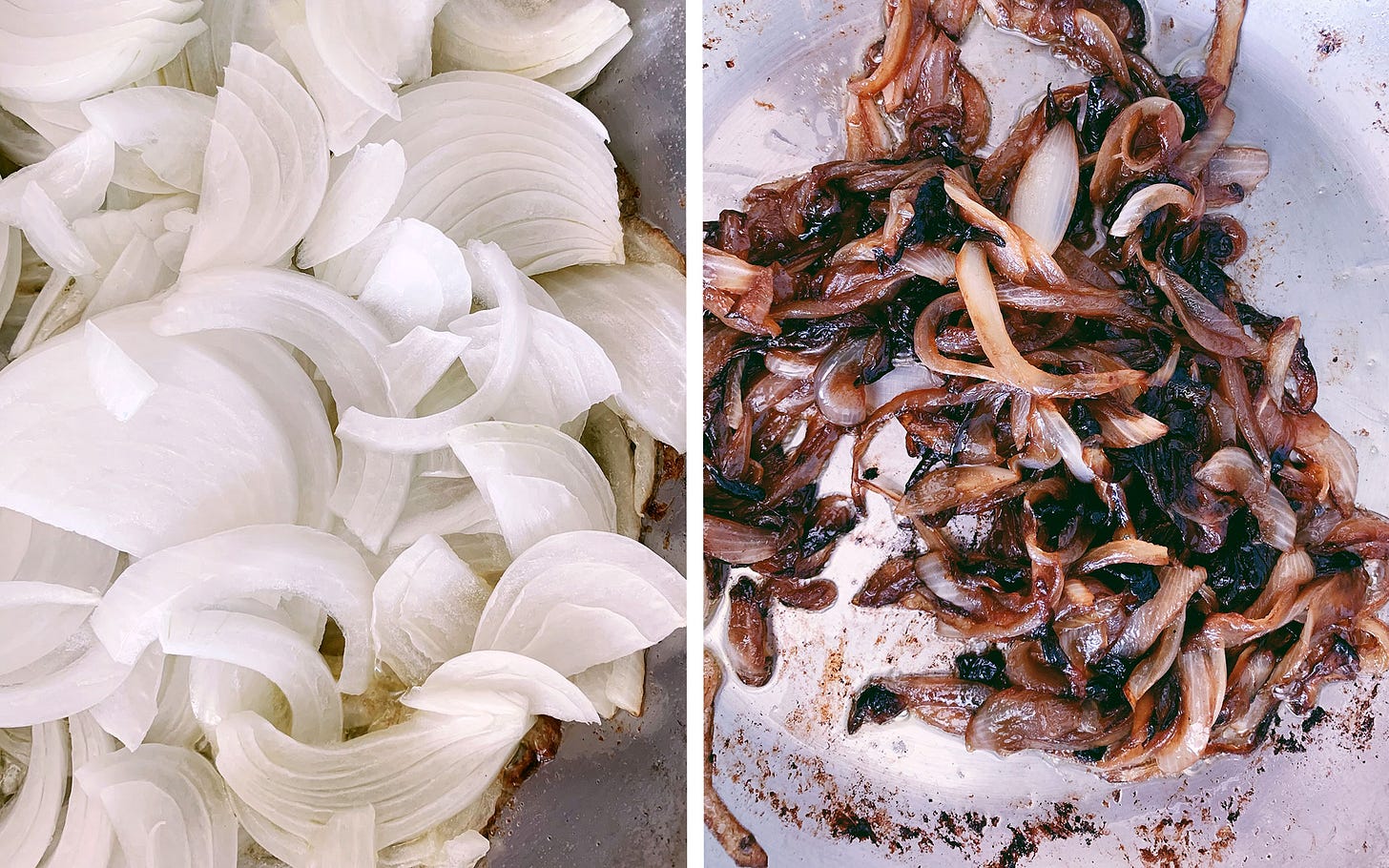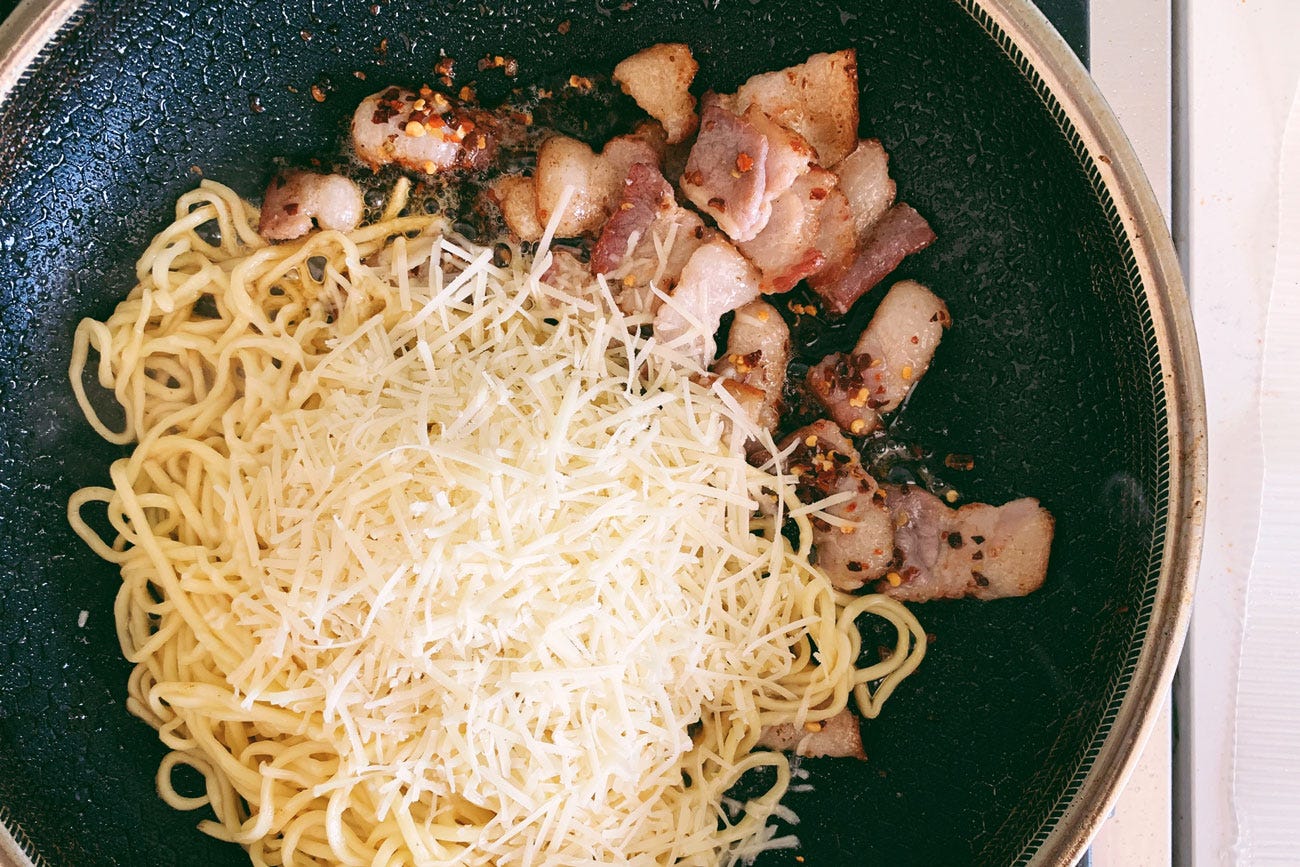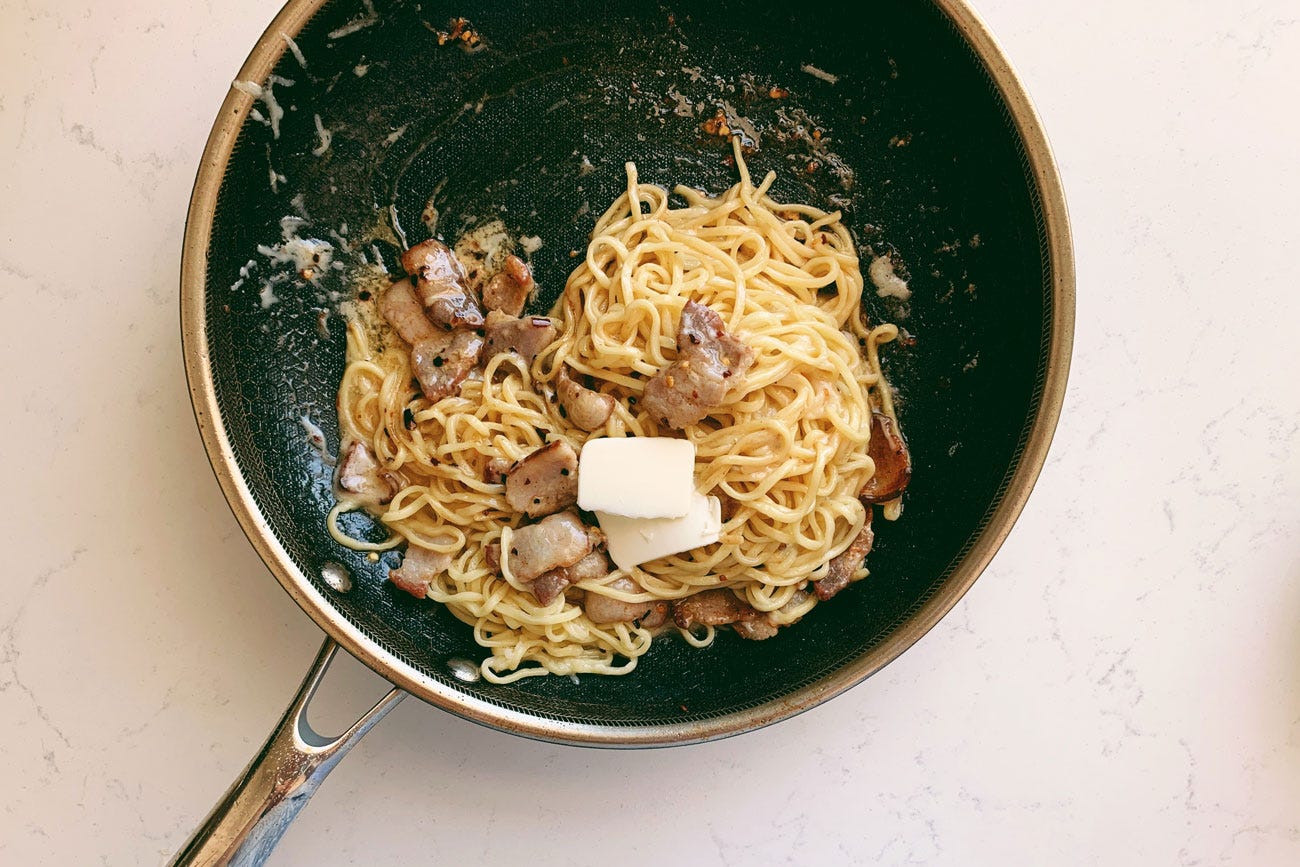re: sanaë lemoine's THE MARGOT AFFAIR
lemoine's food writing in her debut novel is phenomenal and so thoughtful.

i read sanaë lemoine’s debut novel, the margot affair, slowly over the last few weeks, as i’ve been slowly working my way through esmé weijun wang’s e-course, rawness of remembering. the course is ostensibly to help you learn the practice of restorative journaling, which can be an immensely helpful discipline when going through difficult times. i personally started the course with the hopes that it would help me work through all the weird mental crap i have when it comes to this damn memoir-in-essays i’ve wanted to write since last year when i was working on the momofuku essay that became the kawi essay.
in lesson 11, esmé talks about quote-gathering, how the act can be a way of boosting wonder in our day-to-day, and, in the exercise portion, she encourages us to spend time gathering quotes. i got stuck on this for days because i wasn’t sure where to start — should i start googling random feel-good phrases? should i try to look up favorite books and authors? if this course were to help me write about momofuku, should i copy down the quotes i pulled from the episode of the dave chang show with eunjo park?
instead, i decided to copy down all the passages about food from the margot affair. there’s a fair amount of food in the novel, not a surprise given lemoine’s background as a cookbook editor, but the food writing stands out because it’s so full of purpose. lemoine isn’t simply throwing in random details of food; she does so with intention; and, as i copied most of them down into my bullet journal, i came to realize that it isn’t just food she’s writing about — it’s the act of cooking.


—
after school at juliette’s, we would make bowtie pasta for dinner. she measured the pasta into two bowls and threw it into a small pot of boiling water. we ate it with melted butter, grated cheese from a bag, and tiny squares of ham she’d cut directly in the packaging. (116)
it’s rare, the book that describes food in a way that makes me want to cook it. so far, i’ve recreated two dishes from the margot affair — a spaghetti with caramelized onions and bacon mentioned on page 185 and the cheese/butter pasta quoted above.
i mentioned the former in my last substack and shared the first video i ever recorded and edited of myself making it. it’s a fairly straightforward dish; it takes time only because caramelized onions take time and patience.
for the cheese/butter pasta, i took the idea from the book but worked with what i had at home — spaghetti and bacon. i cooked my bacon in a pan, starting it cold and letting it come to temperature with the pan because i learned somewhere that that helps all the fat render out. i tossed my fresh spaghetti in salted boiling water and let that cook for a few minutes, reserving some pasta water for my sauce. once i’d drained my spaghetti and set it aside, i tossed a shit-ton of grated parmesan into the bacon pan, poured in some reserved pasta water, and mixed it all together to make a sauce before throwing in the spaghetti. i removed the pan from the heat and added two pats of butter, mixed everything together, and sprinkled on more grated parmesan and red pepper flakes before eating. it was very simple and very delicious.
i’m not done yet, either. the next dish i plan to recreate is this tomato tart:
for dinner mathilde made a tomato tart with fennel salad. she had bought the tomatoes at the market and they spilled juice onto the cutting board as she sliced them open. she always made her own crust and shaped it like a true pâtissier, leveling off the edges until it was flush against the mold. beneath the tomatoes, she added a layer of parsley pesto and grated cheese. i helped her pick fennel fronds for the salad. (80)
anyway, let’s talk about home cooking.





—
there are three ways of home cooking represented in the margot affair.
margot is seventeen, the daughter of an actress mother and politician father, and she’s a secret — her father is married and has two sons. her father isn’t absent, though, spending as much time with her and her mother, anouk, as he can. margot often spends nights with her best friend, juliette, who lives in her own apartment, sans parents, in paris. their cooking is the cooking of teenagers, quick and convenient.
anouk enjoys food and loves to indulge when out, but she isn’t the cook-at-home type, often busy teaching and rehearsing when she isn’t performing. she isn’t the type to cook meals from scratch. instead, she’ll buy and reheat prepackaged meals or throw together dishes from jars and cans, whatever gets the job done in getting food into her and margot’s bodies.
finally, there’s brigitte — an older woman who befriends margot and becomes a confidant of sorts after something changes permanently in margot’s life. margot looks up to brigitte who seems to embody a certain kind of well-possessed, happily-married, satisfied woman. brigitte knows how to cook, preparing home-cooked meals from scratch.
(there’s also mathilde, one of anouk’s good friends, who also knows how to cook.)
i think we have a tendency to romanticize home-cooked meals made from scratch. i get it to an extent — cooking takes a lot of time and planning, and there’s a lot of clean-up involved. it’s exhausting. it’s no wonder that we attach so many positive emotions to it, like, cooking is an act of love and care, or, like, someone (usually a woman in the domestic realm) who cooks is a warm and generous person, a good person. we sentimentalize mothers who whipped up elaborate dinners every night, even more so if they also worked outside the home, and we excuse mothers who fed us dinners from boxes, cans, and jars with bashful, apologetic laughs.
there’s nothing new about any of this — i’m sure much has been written about the gendered bullshit of domesticity, and i’m not interested in adding to it — but, as i was copying down these passages from the margot affair, it struck me how seamlessly lemoine integrated so much thoughtfulness into her novel. there aren’t very many writers who can effortlessly weave food writing into fiction, but lemoine is one of those rare writers who do so intentionally and purposefully. she doesn’t mention food simply for the sake of doing so.
the same goes for cooking. we see things through margot’s eyes; she is the narrator, after all. we’re there with her as she struggles with her feelings about her father not recognizing her as his daughter or spending more time with her and her mother because he has another family, a public life, and we’re there as she meets brigitte in the aftermath of a decision that changes her life forever. brigitte is different from the other women in margot’s life — she’s someone new, someone who represents a different kind of future. maybe more to the point, brigitte isn’t like anouk, and their differences stand out starkly just in how they cook.
i think this stood out to me because it makes me think of how i’ve personally changed. if the margot affair had been published ten years ago, i might have read it and thought, omg brigitte is so awesome; anouk is not a very good mother. i would have put brigitte on a pedestal because i used to be such a snob, totally attaching this gendered, moral value to cooking from scratch. i’ll readily admit that there were years when i thought of myself as somehow better than other people because i’d make my tomato sauces from scratch and roast chickens at home and hand-roll out my own pasta. now, looking back, i can see that that snobbishness was hiding a whole lot of insecurity and loneliness, but we’re all only ever truly wise in retrospect, aren’t we?
—
my primary love language is food; to me, cooking a meal for someone signifies great love and care. it’s not simply about the act of cooking, the time and energy that go into prepping a meal, cooking it, and cleaning up afterwards. feeding someone is an expression of love because it requires learning and remembering that person’s preferences and tastes and habits, and, in so doing, getting to know someone deeply and intimately.
however, that’s just what cooking means for me personally, and i can’t expect someone else to think of it in the same way, to return love to me in that way. this is a timely personal lesson because i’m currently in los angeles with my parents, and we have very different love languages and things we value. like i said, my primary love language is food. i spend a lot of my time out here cooking for them, occasionally packing them lunch as they go to work (both my parents are considered essential) and preparing dinner half the week. when i can, i order takeout from restaurants i like in order to help broaden their picky palates and share the things i love with the people i love.
my parents, however, are not much into food. my mother yesterday asked why i picked up vietnamese food for lunch, like, why a vietnamese sandwich, why not one i make at home when i make good sandwiches? i said that i had been craving banh mi, to which she asked, do you just want things sometimes?, to which i said, all the time! do you not get cravings for certain foods?
she said, no. she does not.
learning to accept love isn’t simply about opening yourself up to the possibility of love; it’s learning the many different languages of love and being able to recognize and understand them. half a lifetime of body shaming left me in shambles, unable to see myself as human enough to deserve love, and body shaming itself wrecked my very perception of love because much of that shaming had been done out of love — like, i genuinely accept that to be true because no one says love doesn’t get twisted up and inflict a lot of pain and damage. i used to think that it was enough for me to piece myself together and tell myself, you deserve to be loved, you deserve to be loved, you deserve to be loved, until i somehow believed it, but i never really thought about what that actually means, what it looks like in real life. what does it mean in practice to love and be loved?
this is what resonated so powerfully with me about the margot affair, how we see this seventeen-year-old wrangle with love. i don’t mean mushy, sentimental love, but love that informs our day-to-day existence and runs deep and makes us feel safe and known. love, the lack of which can flay us open and change us completely. margot is unsure what to make of her parents’ relationship, of her father’s relationship to her, of her position as the secret daughter, and she sets in motion a series of actions she can’t take back, that permanently alter her life. i think i’m making the novel sound more emo and dark than it is; the margot affair is warm, sweet, and heartfelt, margot’s narrative voice calm and steady.
margot doesn’t have everything figured out by the end of the novel — that would be an impossible ending. the final major cooking scene comes near the end, and i think it beautifully carries us to the conclusion of margot’s arc, especially as it follows an emotionally frank conversation between margot and anouk.
anouk raised her eyebrows and smiled. see, even today, you’re wondering. she released her grasp from my shoulders and switched on the light. it’s time for dinner, she said.
i watched her cook. every gesture was unnatural. she attacked the ingredients, never pausing to consider their softness or fragility. did she handle me the same way when i was born? it was almost impossible to imagine her with a baby in her arms. she was known to chop an unripe avocado into tiny hard squares and serve that for dinner.
[...]
anouk filled the saucepan with water and placed it on the stove. she turned on the flame but didn’t think to cover the pan. it would take longer for the water to boil. then she opened a jar of tomato sauce and emptied it into another pan. the sauce sizzled. i went over to give it a stir.
the only other thing there was to eat was salad. lettuce past its expiration date, the bag ripped open and its contents dumped into a bowl. the leaves clumped together in fermented wads. she set the table with two place mats, napkins folded under our knives, a bottle of sparkling water at the center. she drained the pasta and drizzled oil right into the colander, then served us two portions. here, she said, handing me a steaming plate. as i took the plate from her, i felt my chest split in half, as if she had stuck her hand in there and cradled my heart. (284-5)
to me, this is the warmest scene in the whole book, the one that brought me the closest to crying. we transmit nourishment, love, and care to each other in so many different ways, and i loved how lemoine so subtly demonstrates this with her food writing in the margot affair.
we still collectively as a culture tend to sentimentalize one kind of cooking, especially when cooking is attached to motherhood and domesticity. the thing is, though, it doesn’t make someone more loving just because she has the time, energy, money, and desire to cook meals from scratch, and it most certainly doesn’t make someone less loving just because she doesn’t have the time or energy or money or desire to cook meals from scratch. i think we need to stop with that bullshit and start making more room for love in all its iterations.
—
other books that excellently bring food into fiction are rachel khong’s goodbye, vitamin and elaine castillo’s america is not the heart, the latter of which poignantly shows how food often serves as the center for immigrant communities. castillo also writes so beautifully about queerness without making a Thing of it, something i appreciated deeply.

—
anyway, hello! thank you to matt rodbard for asking me questions about this little substack of mine and including me in his excellent write-up on indie food newsletters for taste. i am such tiny beans and do not come from food media and struggle with a crippling amount of imposter syndrome when it comes to writing about food/food media, so this was really cool. thank you to all y’all new people who are here! as a fun parting look, here is a look at what i am currently working on. next week’s substack, though, will be all about kimbap.

